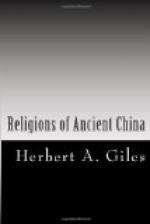She who first gave birth
to our people
Was the lady Chiang
Yuan.
How did she give birth
to them?
She offered up a sacrifice
That she might not be
childless;
Then she trod in a footprint
of God’s, and conceived,
The great and blessed
one,
Pregnant with a new
birth to be,
And brought forth and
nourished
Him who was Hou Chi.
When she had fulfilled
her months,
Her firstborn came forth
like a lamb.
There was no bursting,
no rending,
No injury, no hurt,
In order to emphasise
his divinity.
Did not God give her
comfort?
Had He not accepted
her sacrifice,
So that thus easily
she brought forth her son?
He was exposed in a
narrow lane,
But sheep and oxen protected
and suckled him;
He was exposed in a
wide forest,
But woodcutters found
him;
He was exposed on cold
ice,
But birds covered him
with their wings.
Apotheosis of Hou Chi.—And so he grew to man’s estate, and taught the people husbandry, with a success that has never been rivalled. Consequently, he was deified, and during several centuries of the Chou dynasty was united in worship with God:—
O wise Hou Chi,
Fit Associate of our
God,
Founder of our race,
There is none greater
than thou!
Thou gavest us wheat
and barley,
Which God appointed
for our nourishment,
And without distinction
of territory,
Didst inculcate the
virtues over our vast dominions.
Other Deities.—During the long period covered by the Chou dynasty, various other deities, of more or less importance, were called into existence.
The patriarchal Emperor Shen Nung, B.C. 2838-2698, who had taught his people to till the ground and eat of the fruits of their labour, was deified as the tutelary genius of agriculture:—
That my fields are in
such good condition
Is matter of joy to
my husbandmen.
With lutes, and with
drums beating,
We will invoke the Father
of Husbandry,
And pray for sweet rain,
To increase the produce
of our millet fields,
And to bless my men
and their wives.
There were also sacrifices to the Father of War, whoever he may have been; to the Spirits of Wind, Rain, and Fire; and even to a deity who watched over the welfare of silkworms. Since those days, the number of spiritual beings who receive worship from the Chinese, some in one part of the empire, some in another, has increased enormously. A single work, published in 1640, gives notices of no fewer than eight hundred divinities.
Superstitions.—During the period under consideration, all kinds of superstition prevailed; among others, that of referring to the rainbow. The rainbow was believed by the vulgar to be an emanation from an enormous oyster away in the great ocean which surrounded the world, i.e. China. Philosophers held it to be the result of undue proportions in the mixture of the two cosmogonical principles which when properly blended produce the harmony of nature. By both parties it was considered to be an inauspicious manifestation, and merely to point at it would produce a sore on the hand.




